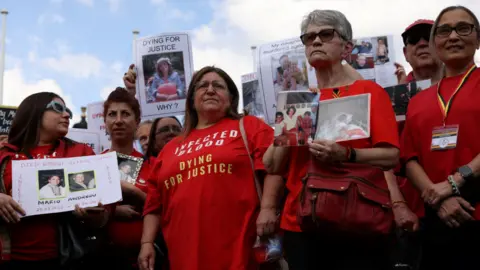Infected blood authority can now pay patients
 Reuters
ReutersMinisters have given the Infected Blood Compensation Authority (IBCA) the power to start making payments to patients.
The Cabinet Office published a lengthy policy paper on Friday detailing the tariff-based scheme and laid secondary legislation setting out the criteria for the first payouts.
Paymaster General Nick Thomas-Symonds said he was "incredibly proud" to have signed the documents which empower the IBCA, once established, to start awarding payments to victims of the infected blood scandal.
But campaigners have warned while further detail is needed there are concerns at the disparities in the proposed compensation for people with Hepatitis viruses and HIV.
More than 30,000 people who received NHS treatment between the 1970s and early 1990s were infected with contaminated blood, and contracted viruses.
The Cabinet Office's paper confirmed the government expects the IBCA to begin making payments to affected persons, including spouses, civil partners and long-term cohabitants of victims signed up for compensation, to begin in 2025.
Regulations set out that patients or their representatives can receive compensation if they satisfy the IBCA they contracted hepatitis C, chronic hepatitis B, or HIV as a result of NHS or armed forces' infected blood.
If patients received infected blood treatment and a diagnosis of hepatitis C between January 1 1952 and September 1 1991, chronic hepatitis B between January 1 1952 and December 1 1972, or HIV between January 1 1982 and November 1 1985, they "will be eligible for compensation on the basis that treatment during those dates is more likely to have resulted in transmission".
The previous government announced the scheme in May following publication of the public inquiry report into the scandal.
Campaigners had feared the payouts might be delayed because of the general election being called shortly after that announcement.
But ministers said earlier this month they wanted to press ahead as quickly as possible.
Pay-outs may also apply to people who contracted diseases from a victim through sexual contact in a long-term relationship, birth, or accidental needle stick injuries, but not if a patient contracted them through sharing needles while taking drugs.
According to an explainer, patients may choose to take compensation as a lump sum or in instalments over five, 10 or 25 years, with future payments uprated in line with inflation.
The government has also confirmed financial loss and care cost compensation awards.
Susan Lee, of the Hepatitis C Trust, said infected patients have waited "too long for this".
"We are still examining the information released today and awaiting further detail, but remain concerned by the disparities in proposed compensation for people who were given hepatitis C, hepatitis B and HIV," she said.
"It is vital that the government does not underestimate the catastrophic and wide-ranging impacts that hepatitis can have on people's lives."
The amount which a patient receives will depend on which disease or diseases they contracted, and their circumstances.
Ms Lee added: "No amount of money can compensate for the suffering endured by this community.
"But without fair tariffs, many people will face even further delays to justice, and tragically more lives may be lost before justice is served."
